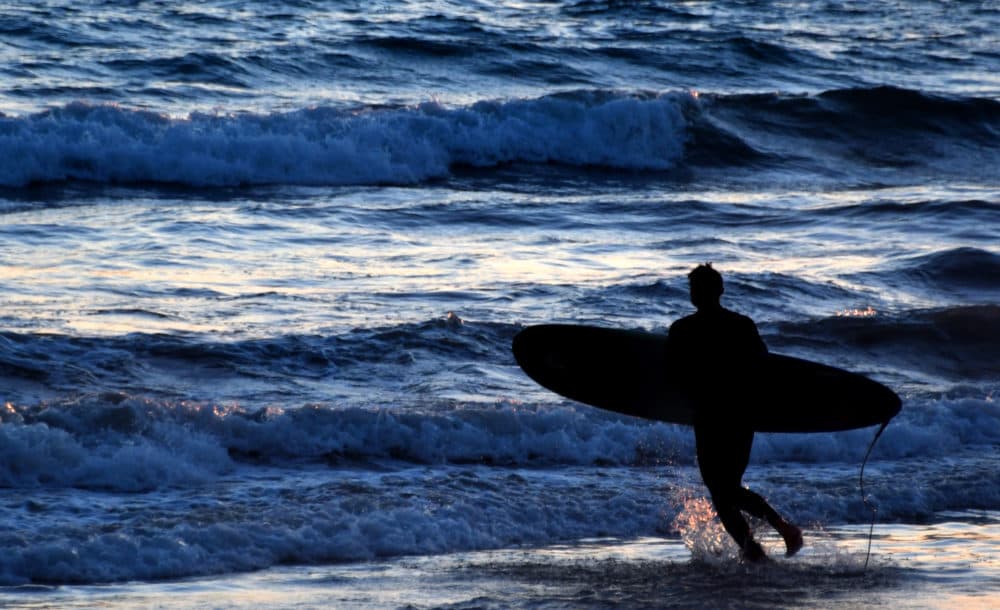Advertisement
Commentary
What Resilience During The Pandemic Really Means

As cases of coronavirus in New England trended down this summer and the temperature and numbers around the country rose, my pod of four returned to some semblance of normal — the beach. I grew up in Rhode Island and I yearn for the sun, sand and saltwater as soon as ski season ends. In phase two of the reopening, it seemed safe to put a toe (or for my boys, a surfboard) in the water.
Aside from having to wear masks in the facilities and limits on parking, the beach scene this summer was essentially normal. Kids buried each other in the sand and teens tossed footballs. The lifeguards swung their legs in front of the new plexiglass screen between them on the chair.
Normal is nice. Normal also makes me worry. As far as I know, sunscreen is unproven against a pandemic causing novel coronavirus and the crowds of teens I saw on the beach were definitely not keeping their distance.
As numbers in Massachusetts creep up again, and the governor considers backtracking on re-opening, I worry about another surge this fall. I worry my kids won’t go back to school even for the hybrid half-time currently planned. I worry that people don’t understand that flattening the curve doesn’t mean we are off the roller coaster yet. Most of all, though, I worry that even when this crazy time in history is past and we all go back to “normal,” we will have learned very little, if anything, at all.
I worry that even when this crazy time in history is past and we all go back to 'normal,' we will have learned very little, if anything, at all.
Perhaps naively, I had hoped that both the pandemic and the recent protests against racial injustice would mark the summer of 2020 as one of transformative historical change: a collective shift in perspective to equity in access to quality education and healthcare, truly equal protection under the law, a recognition of the importance of quality childcare and clean air, the value of parenting to our economy; a real understanding of what true work-life balance looks like. Maybe we could be better, stronger, but most importantly different than before; for ourselves, sure, but even more for our kids.
We’ve heard this pandemic described as a collective trauma. The experience of marginalized people of color living in the United States is differently traumatic. While it may be my own Generation X and those older than us getting sickest, it’s our kids who will experience the ripple effects of these generational traumas for far longer.
As a pediatric psychologist, I work with families impacted by traumatic burn injuries and diagnosed with life-changing illness. Trauma forces time to slow down. When we realize we can’t hit rewind, we can’t undo what’s been done or what’s happened, we often have to stop and re-evaluate where we are headed. Don’t we owe it to our kids to consider where we’re leading them?
Advertisement
Resilience doesn’t mean bouncing back to normal. It means being transformed toward a new normal.
Trauma work centers on acceptance. Acceptance doesn’t mean being okay with what isn’t okay or acting as though things that are hard are easy. It means acknowledging that things are not as we want them to be and then finding ways to live and even thrive in spite of that; changing what needs to be changed even when it’s really hard. Acceptance often means forging a new path. I hoped that this pandemic would force us to collectively slow down, re-examine our values and our behaviors and (in therapy-speak) bring them more in line with each other.
Anxiety, depression and suicide have been rising in adolescents for a decade; at the highest rates among kids and teens of color. I suspect that the teens on the beach are flouting masks and physical distancing not just because their frontal lobes are immature and they believe they’re invincible. I think they’re calling us out. They see how the people in charge have bungled the pandemic response. News of another Black body shot for no reason is routine. It’s obvious to them that the grown-ups are not going to take seriously the job of making things better.
Unfortunately, people tend toward homeostasis. We want to go back to normal, not to a “new normal.” Ask the average person what it means to be “resilient” and they’ll say some version of “bouncing back” from adversity. We want our economy to bounce back and we want to get back to our jobs, schools and routines. Except that’s not actually resilience.
Resilience is not a state of being but a set of skills honed through adversity. To be resilient isn’t to go back to being the way one was before. It’s to allow oneself to be changed, to see the cracks in the self or the system, let the light shine through and to become (in the words of Hemingway and a million memes) stronger at the broken places.
Resilience doesn’t mean bouncing back to normal. It means being transformed toward a new normal. I see this in the kids and teens I work with who’ve suffered individual trauma. They show the greatest resilience. They lead their parents in the hard work of real acceptance. I hear it too in their response to this time of collective trauma — in the plans they’re making, the protests they’re leading, and the conversations they’re having with peers when the adults aren’t listening.
This is my hope for the grown-ups — that we can let ourselves be shaped by this moment — for the better of us all. This generation will be changed for sure. Maybe we should let them lead.
This segment aired on September 16, 2020.
